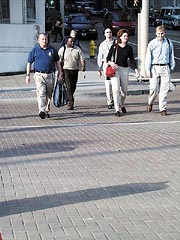
Unnecessary Surgery
According to a study by the Rand Corp., a significant number of surgical and medical procedures are performed unnecessarily. For example, among the five most common procedures performed in the United States, the study concludes:Fourteen percent of coronary artery (heart) bypass surgeries were unjustified, 30 percent were debatable and 56 percent were appropriate.
Thirty-two percent of carotoid enadartectomies (removing plaque buildup in neck arteries to prevent stroke) should not have been performed, 32 percent were borderline and 36 percent were justified.
Twenty percent of pacemaker implants were unnecessary, 36 percent were debatable and 44 percent were justified.
Seventeen percent of angiographies (x-rays of heart arteries injected with dye) were inappropriate, 9 percent were borderline and 74 percent were justified.
Seventeen percent of gastrointestinal tract endoscopies (visual exam of stomach with a tube through the mouth) were unjustified, 11 percent were debatable and 72 percent were appropriate.

Asking Questions
In their book, “Problem Employees: How to Improve Their Performance,” Peter Wylie and Mardy Grothe tell of four types of questions you can ask employees to find out what they’re thinking.Open-ended. These questions make it difficult for employees to tell you what they think you want to hear. For example, ask, “How did things go at the job while I was away?” Don’t ask a closed-ended question such as, “Did everything go OK while I was gone?”
Fact-finding. Ask questions to find out what information employees can provide and to learn whether employees know what they should know. Examples: “What were our gross sales for the fourth quarter?” or “When is the deadline for submitting that bid?”
Comprehensive. Offer specifics the person might focus on when answering. Examples: “How, in general, did the project go?” “What have you been working on the last two days?” What do you particularly like and dislike?” “Have you been encountering any difficulties?”
Thought-provoking. Focus on your relationship with an employee and how the employee views you in that relationship. “Tom, I’ve been thinking about our working relationship lately, and I’d like to try to improve it. What could I do, as your boss, to make your job more satisfying and less frustrating for you?”

Skill-building Tips
Our friends at the Kessler Exchange in Northridge, Calif., offer these five-minute skill-building activities that can boost productivity, confidence and enthusiasm.Look over your plans for the day. Try to eliminate one activity that’s not directly contributing to your success.
Think of something that you or others need that would make a good business. It will build a keener awareness of opportunities.
Think of someone who wastes a lot of time and list how that happens. Then ask yourself, “Do I do any of that?”
Think about what you accomplished last month. How could you accomplish more this month?
Do one thing today in a very different way. Try a different … route to work, chair, lunch partner or job method. Flexibility is powerful, and a change in routine gets you thinking more creatively.

Take a Walk — in Cincinnati
If you have to be a pedestrian, you’re best off walking around Cincinnati, and you want to steer clear of Orlando. A recent report from the Surface Transportation Policy Project says Mickey’s central Florida home is the nation’s most dangerous large metro area for pedestrians. The nine other areas on the group’s most dangerous list also are in the Sunbelt.The most dangerous places were “marked by newer, low-density developments, where wide, high-speed streets offer few sidewalks or crosswalks,” the report claims.
The report criticizes states for not making better use of what federal money is available. Despite a 40-percent increase in federal transportation dollars going to the states, no state spends more than 2.7 percent of that money on sidewalks, crosswalks, traffic calming, speed bumps, multi-use paths and safety education. Part of the reason for less spending on such items is the tremendous pressure to concentrate spending on campaigns to prevent drunken driving and encourage seatbelt use.

Write It to Remember It
Forgetfulness, a plague to many and a concern of most, is a critical effectiveness robber. But there is a solution, and it’s a habit that increases productivity tremendously — if it’s worth remembering, it’s worth writing down.Writing it down also is a stress remover, relieving the strain of trying to remember and freeing the mind to move on to other thoughts. Additionally, it avoids the feeling of guilt when something important is forgotten.

Know Your Banker Well
It’s important to have a strong relationship with your banker, and it’s a two-way street. Watch out for danger signs signaling indifference on the part of the bank.If the bank changes your loan officer, and the new person doesn’t meet with you in a timely manner to learn about you and your business, that’s not good.
If your loan officer changes more than once in a 12-month period, that’s a bad sign.
If your loan officer retires anytime soon after being assigned to you, the bank’s telling you that you’re not very important.

Business Development
Don’t feel alone if you are concerned about our economy turning around. “This year presents a lot of uncertainty for the construction industry,” states Mr. John Kreiss, a principal with ZweigWhite specializing in contractor consulting services. Based on the Construction Financial Management Association’s 2002 annual survey, more contractors anticipate a decrease in volume this year. Kreiss shares a few business development ideas to help your firm optimize its potential:Call your existing clients. Ask them about their plans for the rest of the year. Not only will this give you a heads-up of what to expect, but your clients will remember you when the need for your services arises.
Keep focused on target markets. Find out what kind of work your firm excels at and market your expert services to this group.
Get out and network. Find out where your potential clients are likely to be and demonstrate you are interested in their situations.

The Chemistry of Leadership
Thomas Drier, writing in his book, “The Executive As a Human Chemist,” tells us that we are drawn to men and women who do not attempt to change or natures, but rather use our natures to the fullest possible extent.These people come across as instinctively understanding others and having respect for them. In turn, they command respect for themselves.
Report Abusive Comment